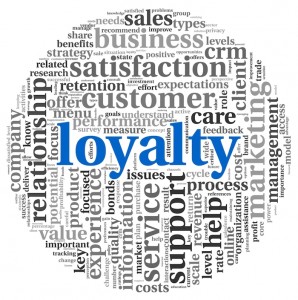 If you’ve worked one day in marketing, you know the consumer sits at the center of every brand’s universe. The consumer’s wants are your wants, and the consumer’s needs are your needs. If a brand can’t be everything the consumer wants, it will wither and die. Or, at least hire a new marketing director.
If you’ve worked one day in marketing, you know the consumer sits at the center of every brand’s universe. The consumer’s wants are your wants, and the consumer’s needs are your needs. If a brand can’t be everything the consumer wants, it will wither and die. Or, at least hire a new marketing director.

Every modern brand follows this same philosophy. But, there's an underlying contradiction to this logic: Consumers expect brands to lead. At the same time, brands are waiting for consumers to lead. It’s like a Mexican standoff where no one wants to make the first move.
Played out over decades, we are seeing the results of this circular logic: brands jumping on every fad, new product introductions that don't match last year's promises, big budget rebrands that quietly revert back to the original and the constant turnover of marketing leadership (which always seems to cite the same issue: lack of vision). The power and institution of brand is eroding, and consumers are the culprits.
No one should be surprised that this has happened. Consumers can, and do, provide tremendous insights to help guide brands and their agencies. But, consumers stand in the shifting sands of a constantly evolving marketplace, susceptible to the whims of culture and society, fraught with insecurities and seeking solace and hope in the next new thing.
Consumers are nothing if not fickle. Brands are chasing them all over the map, and it’s consumers who are getting lost.
The great brands of our time were enduring icons of stability. They stayed true to a vision and worked hard to perfect their products and lead their consumers. They endured failure by creating better solutions, not changing direction. And they always stayed one step ahead of consumers, remaining relevant over decades.
In Malcolm Gladwell's book “Outliers,” he brilliantly proved that it takes 10,000 hours to become great at anything. This single-minded pursuit — let’s call it ethic — is what defined people like Steve Jobs or The Beatles as well as countless other successful business people, artists and performers. They didn't jump from idea to idea, and they didn’t chase every consumer insight. They committed the time to perfect and improve what they were good at, working to get better and smarter every day. So strong was their ethic that entire organizations and cultures were built upon it. And what's most telling is that this ethic was more enduring than any single product they made.
Today’s brands on the other hand act like politicians, shifting direction with every bit of new research and insight. They don't focus on anything long enough to get good at it, much less great. And that's the central problem with most brands today: without this inherent ethic and determination to always do what they do even better, there are few exceptional products or amazing experiences for brands to hang their hats on.
For every Nike, Apple or Google, there are thousands of brands fumbling in the dark, looking for new direction from the very people who are relying on brands to provide direction.
So, how do you create a brand with a strong ethic?
- Don’t be afraid to hold tight to your beliefs. If you have a vision, be unwavering. Have confidence, and don’t let anyone steer you off course. With enough work and effort, you can make your vision work.
- Let consumers behind the curtain. Tell stories of the people who put their blood, sweat and tears into their work. Show the craftsmanship, the devotion and the passion. Showcase the people who perfect their skills. Consumers love people who make incredible things.
- Don’t chase consumer admiration. Use consumers’ insights to perfect your output, inspire improvements and remain relevant in their lives. Don’t allow insights to redirect your vision or push you away from what you do.
- Make your ethic central to your culture. A great brand must operate as a catalyst for culture. If you look at Google and Apple, you see culture is their brand, and brand is their culture.
- Make exceptional products feel exceptional. Consumers greatly desire objects with meaning, character and a story. Tell someone about a great wine, where it came from and what it means, and they will do anything to get it.
Remember, consumers have no ability to tell you who you are or what your organization is capable of being. That can only come from inside. So, take a hard, critical look at what you are truly great at. Uncover your organization’s ethic, believe in it and build a brand culture that celebrates it. It will inspire both you and your consumers.

![28 Brands That Go By Different Names in Different Countries [Infographic]](http://53.fs1.hubspotusercontent-na1.net/hubfs/53/%5BAgency_Post%5D/Blog_Images/brand-names-different-countries.png)


